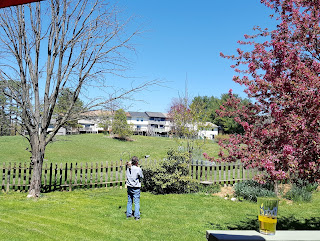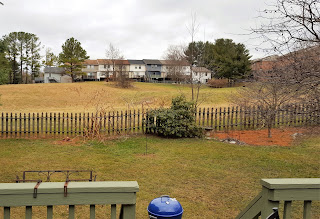I always wanted to plant a vegetable garden when I became a
grown-up. My parents planted a garden every spring in the backyard at our
house in Virginia Beach. Baby boomers both, Victory Gardens had been a thing in
their childhood, a way to feed the family when rations were scarce that they
had learned from their parents. My mother’s father, my Daddy Mac, planted acres
of vegetables and fruits – asparagus and sugar snaps came in first, in time for
Easter dinners that Grandmother would prepare for the family. Strawberries
arrived next; Grandmother jammed those.
When we returned to Maryland for our annual, two-week,
summer visit with my grandparents, tomatoes and cukes would be ready to pick,
along with summer squash, green beans, and shelling peas (hardier than their
sugary cousins in the hotter summer months). Blueberries, cherries, and blackberries
– my favorite – hung ready for the picking. Sis and I ate as much as we
harvested. Grandmother thumped cantaloupe on the vine, selecting the next
morning’s breakfast. Corn usually tassled in time for us to pick several paper
grocery bags of Silver Queen to take back home at the end of our visit, along
with a Farmer’s Market worth of fresh tomatoes and squash (Mom’s favorites),
and a dozen pints of strawberry jam.
I have wonderful memories of everything I ate that was
harvested from that garden.
I attempted my first in-ground vegetable garden while I was
still in grad school in the early 1990’s. (I had been gardening in pots on the
patio with mixed success.) My Daddy Mac bought me a cultivator and showed me
how to use it when he and my Grandmother visited. “You have to cultivate,” he
demonstrated with short chopping motions of the long-handled, narrow digging
blade. The plot I had selected for my salad patch lacked two essentials for
success, though, good soil and ready access to a water source. That garden yielded
nothing, but I held on to the cultivator.
Fast forward to 2009 when I opened my Facebook account. I
also played my first game of Farmville. I liked the premise of the game, and I
quickly planted a virtual garden that, now that I reflect on it, greatly
resembled the garden my Daddy Mac used to plant. This garden thrived, and before
long, the bounty of my virtual fields had allowed me to afford a fairy princess
castle, which was guarded by frolicking doggies, strolling kitties, and a
collection of Chinese ornaments that adorned the grounds of my guest pagoda. I
played steadily for about ten months, amassing more virtual crap than I had
free storage to house. Then I walked away. What a time suck! And I couldn’t eat
any of it...
(I feel a bit guilty about all the virtual pets I quit
feeding.)
My success in Farmville, and my more settled status as a
home owner, emboldened me to try my hand once more at an in-ground vegetable
garden, which I planted in the spring of 2010. I borrowed a friend’s tiller,
augmented my already fertile loam with high-test garden soil, and planted two
rows of tomatoes in several varieties. To my astonishment, the garden thrived. I
weighed the yield each time I brought in a basket load of vine-ripened tomatoes,
and the number hit the high 100’s before the first frost killed it all that
October. I sauced and froze a winter’s worth of tomatoes. It was glorious.
 |
| This one was delicious. |
Then, reality set in.
Farmville doesn’t address two critical realities about
farming, and neither did my first season as a home gardener. The first is weather.
Farmville doesn’t have droughts, hail, or late May frosts. The plant-to-harvest
cycle in the virtual world is pretty straight-forward: you plant, you wait the allotted
amount of time, and then you harvest, clicking with satisfaction on each
square, or deploying the tractor (as any successful farmer does) and harvesting
four contiguous fields with a single click. Miraculously, my first season, the
weather didn’t mess with my IRL garden either.
The second reality, unaddressed by Farmville, is critters: varmints,
rodents, mammals, and birds, slugs and stink bugs. The virtuality of Farmville
has none of these creatures. Neither does a home garden—the first season – word
takes time to get out on the critter telegraph, but one season appears to be sufficient.
My second season, the garden yield went down. Half of my hot
house tomato plants failed to thrive in the unseasonably cool spring, and the
local rabbits discovered the row of sugar snap seedlings before much growth
could occur. I persisted, and eventually, I harvested enough tomatoes to sauce
and freeze another winter’s worth (my spaghetti with fresh sauce is a signature
dish).
My third season, the stink bugs hit. They bite the ripe
tomatoes just once, but the result doesn’t look delicious. Stink bug bites turn the
fruit a dark, diseased color, like bruises from an abuser, that extends to the tomato's core. Lovely slices of fresh tomato are not possible when stink bugs have
infested your garden.
Farmville never tells you that.
In 2016, I had to rearrange the salad patch layout to
account for the fact that my trees have gotten taller, shading the original
garden plot. Maple, pine, dogwood, and crab apple trees do not appeal to stink
bugs as a food source, so they thrive. Later that year, some developer broke
ground on a new neighborhood of town houses in the field across the street that
once sheltered deer, ground hogs, and bunnies. As a result, the critters have
moved into the field behind my house.
They found my vegetable garden.
 |
| The Critters Did This to the Squash and Cukes |
 |
| The Pot at the Bottom Once Had a Tomato Plant Larger Than the Pot at the Top |
I don’t mind feeding critters if the cost is a bag of bird
seed and five minutes of my time. My salad patch exacts so much more from me,
in both time and dollars, and as with Farmville, I don’t get to eat any of it.
It’s okay, though, in two more seasons, the trees will have
thrown shade across my entire yard. I’m going back to pots on the patio.
Game over.




